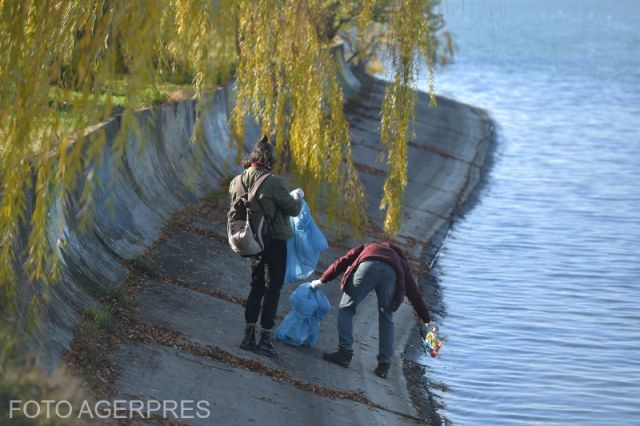Environmental Problems in Bucharest
The Romanian capital Bucharest is not only the most polluted European capital, but it has a level of pollution way above normal

Christine Leșcu, 17.08.2022, 00:06
The Romanian capital Bucharest is not only the most polluted European capital, but it has a level of pollution way above normal, endangering the health of its citizens. In addition, over the last few years, another phenomenon has been noted: the quality of air in Bucharest is variable, especially depending on the season. During winter, and more recently autumn, pollutants tend to be higher, as higher levels of burning occur.
These conclusions, along many others, are in the report for researching the quality of the environment in Bucharest, recently launched at the request of the Bucharest Community Foundation. In fact, this report is the basis for the NGO platform to which civic activists and local administration representatives are invited to participate. The environmental problems in Bucharest come in many forms, and have been ignored for a long time. They now need concerted efforts to find solutions, which leads to the reason for creating this platform. Of course, any attempt at this has to be preceded by a detailed analysis of the situation, and this is what professor Cristian Ioja did with this research report, looking at the sources of pollution in Bucharest. Here is what he found, in short:
“Bucharest has issues with suspension particles, has problems with nitrogen oxides, has problems with benzene, has issues with many categories of pollutants. In the end, it is mostly about the way in which we choose to commute in the city, because the main source of pollution within the city is traffic. Most of the citizens of the city choose a car to commute and move within the city. Also, Bucharest has a fairly low rate of use of public transportation. What is the further meaning of this type of mobility? This mobility represents public space occupancy. We are surprised by the number of automobiles registered in Bucharest in the last few years. However, this has to be taken further, in terms of occupancy of public spaces, because we can see that most sidewalks in the city are occupied by automobiles. Which bring us the issue of cleaning up the city, because if institutions want to clean up the city, there is the humongous effort of moving aside all cars just to clean up a street. Also, speaking of green spaces, the authorities show us some figures, and we are told that they are very close to the targets set by the legislation. However,if we look at what happens in reality, we can see that our main green spaces are crowded, including by cars.”
How did we find ourselves in this situation? By a combination of economic interests and the neglect that Bucharesters show. Here is Cristian Ioja:
“I believe that, at this moment, what has to be understood, at the level of the city, is that some have to gain from a polluted environment, a polluted air, bad water quality, the lack of green spaces, the poor management of waste, and our over the top consumption. So, practically, right now we can talk about an economy that is oriented towards a model of consumption in Bucharest where there is no awareness, or there is no taking into account too much environmental issues. I believe that one of the most important problems, which branch out into the environmental issues that the city has, is the fact that there isnt much attachment towards the city. The attachment towards the city is very low, lets say a very low sensitivity towards what happens further down the line as a result of our individual choices. If we climb in the car every day for each movement we make, we have to be aware that we have no way of having clean air. By the same token, if we have exaggerated consumption of products, we cannot have a circular economy. So basically these individual gestures, multiplied at the scale of the city, bring with them this multitude of problems we are facing at the present moment.”
Over the last few years, waste management has truly become a serious problem. Waste has been piling up, and the authorities have not managed to keep up with selective collection, recycling, and storage. Which is why you can see on the fringes of the capital improvised garbage dumps, and in the nearby villages waste is getting burned, releasing into the air substances that are extremely harmful for the health of Bucharesters. For the time being, the Environmental Guard seems to be overwhelmed by the number of incinerations, and their interventions are meager faced with the size of the phenomenon. Generally, the authorities are clumsy intervening, and burdened by the bureaucracy. This was the conclusion presented by Bucharest Sector 2 mayor upon taking over his position:
“Community police came to tell us that we should be fining the Romanian Waters public state utility for not cleaning up their bodies of water. We have the chain of bodies of water in the northeast of Bucharest, and we had a discussion with Romanian Waters. They told us that they themselves could fine us because the citizens of Sector 2 are dumping garbage in the city lakes. I think that this best describes the way in which the authorities were relating at that time to managing waste: how we could best slap fines upon each other. We sat down with the director from Romanian Waters, and we agreed to attempt to do something in common. We signed a protocol, and it took us about three months to formulate it, because, even though the political will was there, this is the Romanian bureaucracy we have to deal with. It took three moths to sign a protocol by which Romanian Waters contributes with machinery, and Sector 2 City Hall takes the water out of this waste and takes it to the dump. We took out over 10,000 tons of waste from the chain of lakes around Bucharest, which shows us what pitiful degree of pollution we have reached in the last 30 years. Waste doesnt go away. If a company takes it over, it doesnt mean it disappears. Many times it ends up in the field, it ends up in the water, and many times it just ends up in peoples stoves as fuel. This is reality. A lot of stuff gets burned in Bucharest, and it gets burned in peoples stoves. We should be managing these things. It helps us very much collaborating with civil society.”
Collaboration between civil society and the authorities is precisely the target set by the environmental platform recently launched by the Bucharest Community Foundation. At the same time, the foundation is keenly aware that this collaboration would have to aim for the really long term in order to produce results and actually reduce pollution.






























